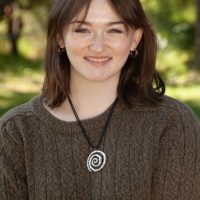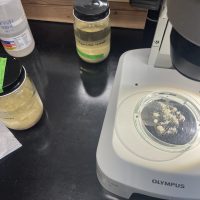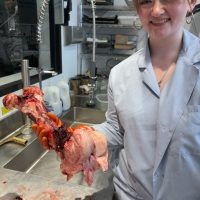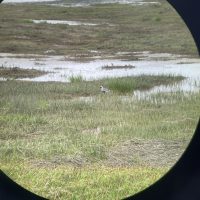Collecting knowledge, skills and experience with the Burke Museum mammal collection
Museum collections tell the story of life on Earth, and are a critical resource for researchers around the globe working on a variety of species, from fish and snails to birds and mammals. In the Burke Museum, the mammal collection is where UW Marine Biology senior, Lauren Grady, has been volunteering for the last two months, building on experience she gained working with the Wood Lab at SAFS.

“I started volunteering in the mammal collection about two months ago. I had been doing necropsies with the Wood Lab in the Burke Museum for a few months but wanted to do more work with the collections specifically,” Lauren said. “I reached out to Jeff Bradley, the Mammalogy Collection Manager, and asked if he had any opportunities available in the collections and he said yes! A big part of being able to work in the collections was because of my prior experience with the Wood Lab.” The Wood Lab is led by Chelsea Wood, Associate Professor at SAFS.
Lauren began working in the Wood Lab last summer after finishing the Marine Conservation Ecology course at Friday Harbor Labs (FHL) during Summer A Term. “I had met with a TA during spring quarter asking if she knew of any opportunities to work with mammals and she connected me to the Wood Lab. I eventually got in contact with Yasmine Hentati, a PhD student studying urban carnivore health,” Lauren shared.

Responsibilities while working in the Wood Lab are varied and take place both in the Fishery Sciences Building (home to SAFS and Marine Biology), and the Burke Museum. “In FSH, my main task has been sorting through and identifying parasites in the gastrointestinal (GI) tracts of terrestrial urban carnivores, such as coyotes, raccoons and river otters. While in the Burke Museum, there will typically be a large group of Wood Lab volunteers conducting necropsies on multiple animals,” Lauren said. “There are so many highlights to being in the Wood Lab and there is never a dull moment, especially when doing necropsies! We have found so many weird and interesting things while performing necropsies. It is hard work, but it is more enjoyable when surrounded by wonderful people who are equally as fascinated by understanding these animals and parasites.”
You may be wondering why scientists are exploring what kinds of parasites are found in marine mammals. Identifying parasites in mammals is important for understanding animal health, disease transmission, and ecosystem dynamics. The Wood Lab specifically delves into questions around the ecology of infectious disease in a changing world, in marine and freshwater ecosystems.
Transitioning to the mammal collection in the Burke Museum, Lauren’s main focus has been assisting in the sorting and organizing of collection specimens. “This includes tasks like labeling skulls, identifying and grouping bones by species and body region, and sorting dermestid beetle remnants for bone fragments,” Lauren shared. One of the highlights so far for Lauren involved a hippopotamus! “Recently, I was involved in the process of skinning part of a hippopotamus to prepare it for the collections! It was surreal. The hippo passed away at the Woodland Park Zoo about a year ago and part of her was given to the Burke Museum for the mammal collections and for further research.”

One of the vital parts of any science degree is to prepare students to put into practice what they’ve learned in the classroom, be that during internships, research experiences, or in a future career. “Being a marine biology major has helped me to prepare for roles like working in the Wood Lab and mammal collections by offering lots of hands-on courses, especially at FHL,” Lauren said. “I’ve taken classes at FHL twice now and was able to watch multiple marine mammal necropsies, gain field work experience, and conduct my own independent research projects. While not entirely related to necropsies and organization at the Burke, I think the skills I have gained through being a marine biology major set me up for success in my current endeavors.”
It’s normal for interests to develop, shift, and grow over the course of pursuing a university degree. For Lauren, being a part of the mammal collection has contributed to this growth. “My interests continue to shift as my academic career progresses. There are many fields within marine biology and environmental science that I would love to pursue. While my main focus right now is invertebrate ecology, I am also attracted to the fields of wildlife veterinary science, marine and terrestrial mammalogy, conservation, and outreach,” Lauren said. “Volunteering in the mammal collection has helped me to connect with so many different people and get to explore my aforementioned interests while gaining an understanding of what it is like to work in a museum—something that I would love to do one day.”

How exactly do students get to be involved in so many research experiences during their time at UW? From reaching out to TAs and research labs and speaking with advisers, to keeping up to date with listservs, these are just a few examples. “It was definitely a mix of all of those! It is super important to make and maintain good connections with professors, grad students, and other faculty. Had I not had a good relationship with my evolution of marine mammals TA, Arial Brewer, I would likely not have reached out to her, and she would not have connected me to the people I work with now in the lab and at the Burke. Keeping up with Handshake and the marine biology listserv are also great ways to find jobs and volunteer work. While I didn’t find these two current roles through those, I do frequently check them as they often have cool lab jobs and other marine science-related positions,” Lauren shared.
As a senior in her final quarter at UW, Lauren is due to graduate in June. Her plans for the future? “I hope to stay in Seattle for another year or two before heading off to grad school. Other than the Burke Museum and Wood Lab, I am still working as a senior intern for the Coastal Observation and Seabird Survey Team (COASST); we just went on our spring intern field trip to the Hoquiam Shorebird Festival and saw many cute and cool birds!”